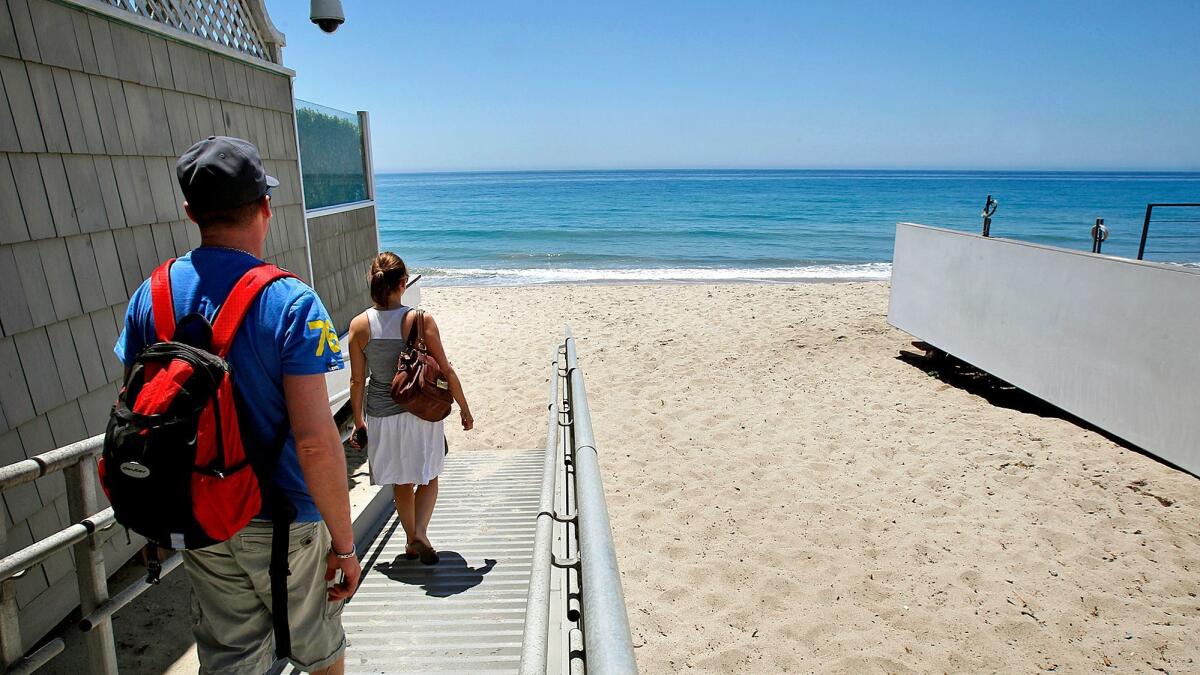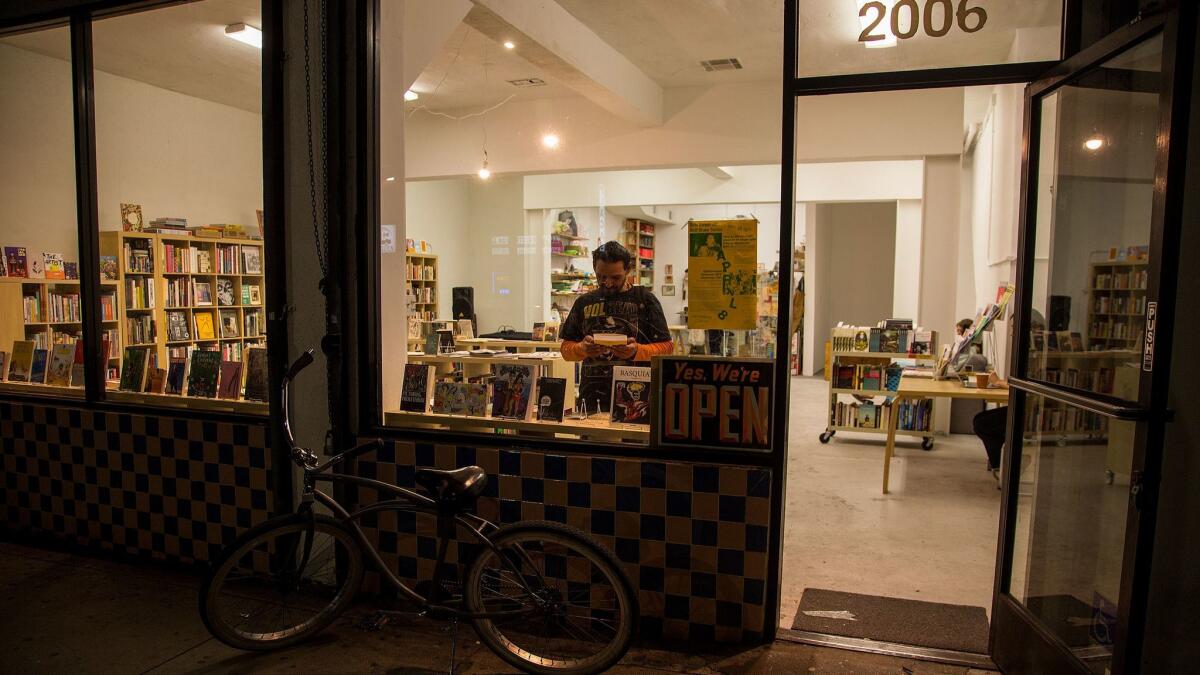Q&A: Daniel A. Olivas on his short story collection ‘The King of Lighting Fixtures’ and more
Daniel A. Olivas’ latest collection of short stories, “The King of Lighting Fixtures,” (University of Arizona Press, $16.95) opens with a character settling into his office at the Public Rights Division of the California Department of Justice. It’s a detail from which readers can expect a certain level of authenticity: Olivas, in addition to being the author of nine books, is an attorney there. (Public access to Malibu’s Carbon Beach? Olivas is, in part, to thank.)
“The King of Lighting Fixtures,” includes flash fiction, speculative fiction, magical realism and more traditional stories; what unites the work is a sense of place. Olivas is an L.A. writer, and he roots his work in L.A.
I spoke to Olivas over the phone about straddling two professions; being a longtime contributor to La Bloga, a website that showcases Latina/Latino literature and culture; and writing the final, dystopian story of his book. Our conversation has been edited.
The collection includes a piece of speculative fiction called “The Great Wall,” in which an ornate, gold-painted wall along the Mexican border is erected. Can you tell me about writing this story?
The book had already been completed when the election happened. I felt like I had to write one more story that addressed
I saw a news story that was chilling to me, where different companies had been bidding to get contracts to build the wall. One contractor was showing how beautiful his walls were — he was showing samples that had little bits of glass and little swirls. He was very proud of his craftsmanship, completely not acknowledging that this beautiful wall was going to separate families.
In the title story, “The King of Lighting Fixtures,” an L.A. Times reporter misquotes the protagonist as saying, “All it takes is a little hard work and a lot of luck,” to build an empire ,when he actually said, “All it takes is a lot of hard work and a little luck.” To set the record straight, what does it take to make it as a writer, hard work or luck?
Ha! I think it’s 50/50. Getting the attention of someone who has the power to get your book published, in some ways that’s the luck part. But writing does take work. So, 50/50.
You received your undergraduate degree in English literature at Stanford, went to law school at UCLA and began your writing career at age 39. Was your path to becoming a writer a circuitous journey?
In many ways my path to becoming a writer was not circuitous. My parents always had books in the house, and we used our library cards when money was tight. They made certain we got to read. I was always writing stories and was very involved with student publications growing up. When I went to Stanford I was art director of the Stanford Chaparral; my editor was Bruce Handy, who is now one of the editors of Vanity Fair. When I was in law school I was editor of the Chicano Law Review of UCLA, and when I became a lawyer I wrote legal articles on land use and civil procedure. So I was always writing, but I intentionally did not take creative writing at Stanford, because coming from where I was coming from economically, I did not view becoming a creative writer to be the smartest thing to do.
Does your legal writing feed your fiction?
Legal writing is really telling a story. People who aren’t successful lawyers are people who don’t realize that their audience is made up of people. A good lawyer knows how to write a brief or a memo that explains why justice should be done. The writing should be interesting. It should tell a story that explains the human side of the legal issues.
Being a lawyer and writing briefs under deadline, as well as having to be succinct and tell a good story and not be afraid to edit, those are things I learned as a lawyer, which transferred perfectly to my fiction, nonfiction and poetry.

“Carbon Beach,” a noir story, is set in Malibu on a stretch of waterfront that was central to one of your cases, which involved public access to the beach outside of David Geffen’s house. How did you approach exploring this setting in your fictional work?
I try not to write about the cases I’ve done, and the story “Carbon Beach” doesn’t deal with the litigation, it’s simply set in an area that I know. I did represent the California Coastal Commission in the litigation against David Geffen, who fought against the opening of the accessway that runs along his house at Carbon Beach. We prevailed, and we ended up with a wonderful settlement that opened up that accessway. If you go there now, you’ll see all kinds of people of all different backgrounds of all different colors enjoying that beautiful beach.
Certainly, I’m not disparaging Mr. Geffen [who sold the property earlier this year] in any way in the story. Places I’ve been will often become the setting for my stories. My main character in “Carbon Beach” is a young Chicano kid, and he’s visiting a part of L.A. — Malibu — that is considered the playground of movie executives and musicians and movie stars. In some ways, I wanted to express that L.A. belongs to all of us.
A number of your characters have legal jobs. In what other ways did you draw from experience?
This is the first collection where I have several stories where the main characters are writers. I realized in pulling this book together that I’m also touching upon the publishing industry and the way that writers of color are treated, and what we’re expected to create. These are issues I’ve been grappling with the longer I write and the longer I cover other Latino and Latina writers. I am fascinated by the fact that we are creating, as a group of writers of color, a huge amount of wonderful work, and we’re beginning to get more and more coverage, but it is a battle, and that’s something that just came through in some of these stories.
My very first short story collection, “Assumption and Other Stories,” which was eventually published by Bilingual Press, I submitted that to several large publishers and a couple agents. I was told once by an agent and once by an editor at a large press, which shall remain nameless, that I was a very good writer, but why couldn’t I write basically a Chicano version of “Waiting to Exhale”?
What is the history and mission of La Bloga?
La Bloga was started over 10 years ago by writers who wanted to get more coverage for Latino and Latina writers. It’s now grown; I think we’re over a dozen writers at different stages of our creative writing endeavors. La Bloga has all kinds of different coverage: interviews, book reviews, politics, food and arts. It’s filled with writing from people who span this country, from East Coast to West Coast and everything in between, and it’s been a wonderfully supportive, loving literary family. The internet has created so many amazing outlets and opportunities for writers of color, and La Bloga is simply one example of that type of forum.
Is the visibility of the local Latino literary community also evolving?
The internet and Twitter have helped writers connect with each other — we’re such a huge city — and we are a louder voice and there are more places for us to express ourselves. The fact that the

With a steady law practice, when do you find the time for your creative work?
I’m not very mechanical about it; for me creative writing is pure pleasure. I don’t fully understand writers who say, “Oh my God, editing and writing is just so horrible.” I don’t know why they write if that’s how they feel. For me it’s a joyous way to spend time. I imagine it’s similar to, say, someone who dances. It might be difficult in terms of the time you put into practice to dance, but in actually doing the dance there is great joy in that expression.
Sign up for our Book Club newsletter
Get the latest news, events and more from the Los Angeles Times Book Club, and help us get L.A. reading and talking.
You may occasionally receive promotional content from the Los Angeles Times.





